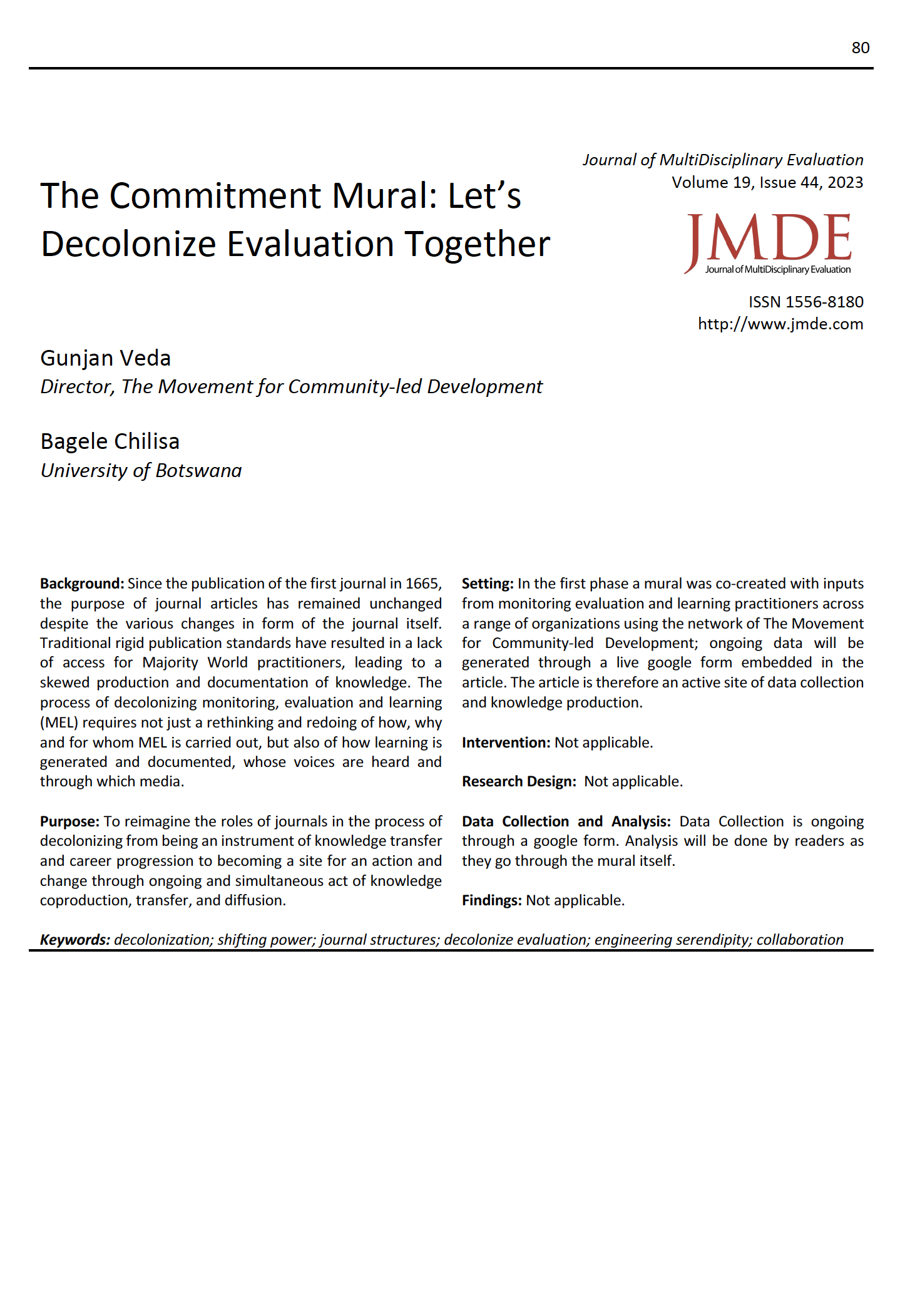The Commitment Mural: Let’s Decolonize Evaluation Together
Main Article Content
Abstract
In this mural we demonstrate liberation of evaluation from normalized publication structures. The article is a challenge to publication structures, more specifically journals, to open space for diversity of expression of thought. In this mural, practitioners, academics, policymakers, development partners, VOPEs (Voluntary Organizations for Professional Evaluations), speak to the strategies to decolonize evaluation. The immediate impact of this mural is a demonstrated commitment to decolonize evaluation by more than 50 individuals and entities. Taking up the commitment will be a demonstrable change that came with the mural. The mural also provides an open space for the exchange of ideas, and strategies to decolonize evaluation. Moreover, the contributing voices are preserved in their own voices and their contribution to global knowledge production is acknowledged. This is indeed a departure from the ethics of confidentiality in research where the participants in an evaluation inquiry largely remain anonymous even in the co-creation of knowledge. We believe that when participants in an evaluation inquiry come across their commitments in evaluation journals, they are encouraged to further form coalitions with like minds and hold themselves accountable collectively to liberate evaluation from the remnants of colonialism.
Downloads
Article Details

This work is licensed under a Creative Commons Attribution-NonCommercial 4.0 International License.
Copyright and Permissions
Authors retain full copyright for articles published in JMDE. JMDE publishes under a Creative Commons Attribution-NonCommercial 4.0 International License (CC BY - NC 4.0). Users are allowed to copy, distribute, and transmit the work in any medium or format for noncommercial purposes, provided that the original authors and source are credited accurately and appropriately. Only the original authors may distribute the article for commercial or compensatory purposes. To view a copy of this license, visit creativecommons.org
References
Chilisa, B. (2009). Decolonizing ethics in social science research: Towards a framework for research ethics. In A. Rwomire (Ed.), Challenges and responsibilities of doing research in Botswana: Ethical issues (pp. 199–207). OSSREA.
Chilisa, B. (2015). A synthesis paper on the Made in Africa evaluation concept. African Evaluation Association.
Chilisa, B. (2020). Indigenous research methodologies. London.
Corsetti, L. (2022, July 13). Decolonising Evaluation Practice: Is it time for an increased conversation in Europe? European Evaluation Society. https://europeanevaluation.org/2022/07/13/decolonising-evaluation-practice-is-it-time-for-an-increased-conversation-in-europe/
Donnelly, K. (2020, August 17). How evaluation perpetuates inequity (and how to stop it). Media Impact Funders. https://mediaimpactfunders.org/how-evaluation-perpetuates-inequity-and-how-to-stop-it
Kerry, S. (2012). Kaupapa Maori theory-based evaluation. Evaluation Journal of Australasia, 12(1), 6–18.
Kwet, M. (2019, March 13). Digital colonialism is threatening the Global South. Al Jazeera. https://www.aljazeera.com/opinions/2019/3/13/digital-colonialism-is-threatening-the-global-south
Lane, J. N, Ganguli, I., Gaule, P., Guinan, E., & Lakhani, K. R. (2021). Engineering serendipity: When does knowledge sharing lead to knowledge production? Strategic Management Journal, 42, 1215–1244. https://doi.org/10.1002/smj.3256
Lindsay, G. (2014, October 31). Engineering serendipity. Medium. https://medium.com/aspen-ideas/engineering-serendipity-941e601a9b65
McKay, M. (2022). Evaluations that ‘leave no one left behind’: Decolonizing Canada’s international assistance in evaluations in Africa. [Unpublished master’s thesis]. Simon Fraser University. https://summit.sfu.ca/item/34904
Rallison, S. P. (2015). What are journals for? Annals of the Royal College of Surgeons of England, 97(2), 89–91. https://doi.org/10.1308/003588414X14055925061397
Ravishankar, A. (2020). Linguistic imperialism: Colonial violence through language. The Trinity Papers (2011–present). https://digitalrepository.trincoll.edu/trinitypapers/87
Russon, C. (2008). an Eastern paradigm of evaluation. Journal of Multidisciplinary Evaluation, 10, 1–7.
S2SE. (2018). Addressing asymmetries in global evaluation: Evaluating the Global South final proposal: Phase 1, 2018–2021. Global 49.
Tarsilla, M. (2014). Evaluation capacity development in Africa: Current landscape of international partners’ initiatives, lessons learnt and the way forward. Africa Evaluation Journal, 2(1).
Villanueva, E., & Barber, W. J. (2021). Decolonizing wealth: Indigenous wisdom to heal divides and restore balance (2nd ed.). Berrett-Koehler.
Vitantonio, C. (2022, May 30). The relationship between language and neocolonialism in the aid industry. Devpolicy Blog [Development Policy Centre]. https://devpolicy.org/language-and-neocolonialism-in-the-aid-industry-20220530/

